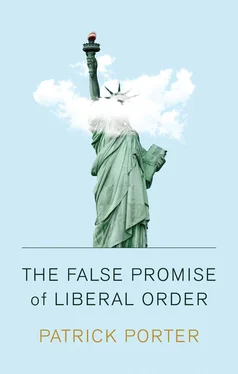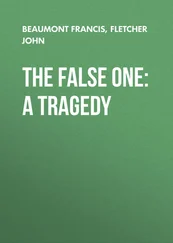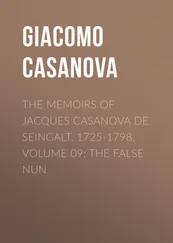Patrick Porter - The False Promise of Liberal Order
Здесь есть возможность читать онлайн «Patrick Porter - The False Promise of Liberal Order» — ознакомительный отрывок электронной книги совершенно бесплатно, а после прочтения отрывка купить полную версию. В некоторых случаях можно слушать аудио, скачать через торрент в формате fb2 и присутствует краткое содержание. Жанр: unrecognised, на английском языке. Описание произведения, (предисловие) а так же отзывы посетителей доступны на портале библиотеки ЛибКат.
- Название:The False Promise of Liberal Order
- Автор:
- Жанр:
- Год:неизвестен
- ISBN:нет данных
- Рейтинг книги:4 / 5. Голосов: 1
-
Избранное:Добавить в избранное
- Отзывы:
-
Ваша оценка:
- 80
- 1
- 2
- 3
- 4
- 5
The False Promise of Liberal Order: краткое содержание, описание и аннотация
Предлагаем к чтению аннотацию, описание, краткое содержание или предисловие (зависит от того, что написал сам автор книги «The False Promise of Liberal Order»). Если вы не нашли необходимую информацию о книге — напишите в комментариях, мы постараемся отыскать её.
The False Promise of Liberal Order
The False Promise of Liberal Order — читать онлайн ознакомительный отрывок
Ниже представлен текст книги, разбитый по страницам. Система сохранения места последней прочитанной страницы, позволяет с удобством читать онлайн бесплатно книгу «The False Promise of Liberal Order», без необходимости каждый раз заново искать на чём Вы остановились. Поставьте закладку, и сможете в любой момент перейти на страницу, на которой закончили чтение.
Интервал:
Закладка:
Ideas about order matter and have weighty policy implications. Just as material power enables or forecloses certain choices, so ideas condition and constrain a country’s grand strategic decisions. Those who lament the fall of the liberal order are saying, in effect, that some ideas are illegitimate and should be off the table. They worry that populism and isolationism endanger traditional ideas that were once dominant, leading America to abandon its manifold commitments overseas. When they call for the reclamation of the old order, they also call for the perpetuation of American primacy. By contrast, I argue that the exaggerated notion of the liberal order and its imminent collapse is one of the myths of empire that helped create the current crisis.
Today’s politics is restoration politics, the politics of promising to resuscitate lost orders. Strongmen, demagogic populists, seek authority by claiming to speak for the true virtuous people against illegitimate alien elites, vowing to bring lost orders back . They will ‘make America great again ’, ‘take back control’, or return jobs, industries, sovereign borders and national pride. 38And they are not the only ones to harken back. Proponents of liberal order see their cause as forward-looking and scold voters and political realists alike for being backward-looking. 39Yet they too traffic in nostalgia. In George Packer’s elegy for the late diplomat Richard Holbrooke, a curator of the Pax Americana , his hero weeps at the 1949 musical South Pacific for the loss of a ‘feeling that we could do anything’, an era ‘when we had gone to the most distant corners of the globe and saved civilization’. 40Cautioning against being ‘backward-looking’, such minds also call for the revival of a system that was founded in atypical and impermanent conditions seventy years ago, under a different distribution of power, an exceptionalism based on America’s technocratic capacity ‘to innovate and solve hard problems’. 41Former Senator, Secretary of State and presidential candidate Hillary Clinton accused Trump voters of ‘looking backward’. But she too appealed to a romanticized past, a ‘long-standing bipartisan tradition of global leadership rooted in a preference for cooperating over acting unilaterally, for exhausting diplomacy before making war, and for converting old adversaries into allies rather than making new enemies’. 42The history Clinton praises was far more mixed. Historically, the USA often acted unilaterally, waged preventive war – and considered doing so – before exhausting all options, including in Iraq in 2003 with Clinton’s supporting vote, and sustained enmities from Cuba’s Fidel Castro to the Iranian Ayatollahs. 43
At times, self-identified liberal traditionalists are risibly nostalgic. The writings of hawkish public intellectual Max Boot exhibit the nostalgia’s imperial turn. Boot champions ‘liberal order’, scolding fellow Republicans that ‘nostalgia isn’t a foreign policy’. Yet he also advises Washington to find wartime inspiration in historical campaigns to pacify frontiers, borrowing his title from Rudyard Kipling’s poem urging America to take up the ‘white man’s burden’. 44Boot’s explicit reverence for empire and its thirst for vengeance, his insensitivity to the genocidal and racial character of his subject, is an extreme case. It also reveals an awkward truth, often only in the margins of other accounts. Namely, that this is a history not simply of benign leaders and the grateful led. It is a history of resistance and imposition, of punitive force. Frequent violence at the hegemon’s discretion, to tame the world into order, is central to the history.
Many believers in liberal order do not share Boot’s enthusiasm for bloody frontiers. They think of themselves as peaceable and law-abiding. When they advocate for force, they believe they are creating a better state of peace. Yet in practice, they exhibit the liberal order’s proclivity to militarism of a kind. Our post-war order, embodied in the United Nations, was originally founded more to limit the use of force in principle – ‘the scourge of war’ – than to license it. As good Atlanticists, though, enthusiasts for liberal order often advocate military exertion under US leadership, and often without formal authorization from the United Nations Security Council (UNSC), to enforce some rules, effectively, by violating others, and in ways they probably would not condone from other states. In August 2013, the liberal Economist denounced the British parliament for voting down air strikes on Syria to punish a chemical weapons (CW) atrocity, a bombing that was urgently needed to enforce a taboo and uphold a rules-based international order. 45Opponents of war, who worried that ill-conceived military action breached rules or due process, and could inadvertently assist Islamist rebels, were branded as insular reactionaries. The assertion that, in the established order, a CW taboo is supreme and must override other considerations is ahistorical, as suggested by Washington’s earlier record in sponsoring a CW-armed Iraq against Iran. Once again, liberal consciences were persuaded that airstrikes should be used as a tool of affordable moral action, denouncing sceptics for their backwardness. Once again, they claimed a special prerogative and disregarded alternative conceptions of order. Once again, liberalism was not very liberal.
The debate over international order is difficult to have in a productive way. The issue mixes up fraught concepts: the question of liberalism, a rich and conflicted tradition; the question of the ‘international’ and how American power should shape it; and conflicting ideas of ‘order’. Liberal order is a moving target. Often it expresses not a falsifiable hypothesis but an article of faith, aspirations about American internationalism that confuse means and ends. As Damon Linker notes, the concept gets caught between two contrary views:
The liberal international order that encourages rule-following and negotiation while fostering peace and prosperity among nations is our handiwork, as is the democratic world we have nurtured around the globe. Those who oppose us in defending this order are evildoers … and we’ll seek to demonstrate this by pointing to every bad thing they’ve ever done as evidence of their inherent treachery and malevolence. We’re idealists, in other words. Moral, well-meaning, law-abiding, leading by principle and example in everything we do.
But that’s only one half of the equation. America might be unwaveringly moral, but we are also tough, ruthless, hard-nosed, realistic about the ugly ways of the world, like a sheriff toiling to establish a modest and vulnerable zone of order in a lawless land. In such a world, the ends often justify the means. When fighting our enemies, we need to be willing to do whatever it takes to prevail. We have no choice … unlike the bad guys, whose every unsavoury deed deserves to be treated as an exemplification of their wickedness, our seemingly malicious actions appear to be rare exceptions, wholly excused by the lamentable necessities that govern a fallen world. 46
Precisely because of the unswerving belief in the order’s decency and soundness, panegyrics offer shallow accounts of the crisis. They serve up glutinous reassurances, that the order has all the answers to its own problems, that what is ‘wrong’ with the order can be fixed with what is ‘right’ with it. 47The order’s defenders offer technocratic remedies: refined institutions, fresh messaging or creative new programmes. If the order is perishing, it cannot be due to its own internal flaws. It is being assassinated, after being made vulnerable through neglect. This dictates unpromising responses, whether to write the order’s obituary, blame ‘defeatists’, or preach for its revival in the hope that the disillusioned will return to its banner. If the world is changing as profoundly as nostalgists believe, we need inquest, not exoneration.
Читать дальшеИнтервал:
Закладка:
Похожие книги на «The False Promise of Liberal Order»
Представляем Вашему вниманию похожие книги на «The False Promise of Liberal Order» списком для выбора. Мы отобрали схожую по названию и смыслу литературу в надежде предоставить читателям больше вариантов отыскать новые, интересные, ещё непрочитанные произведения.
Обсуждение, отзывы о книге «The False Promise of Liberal Order» и просто собственные мнения читателей. Оставьте ваши комментарии, напишите, что Вы думаете о произведении, его смысле или главных героях. Укажите что конкретно понравилось, а что нет, и почему Вы так считаете.












